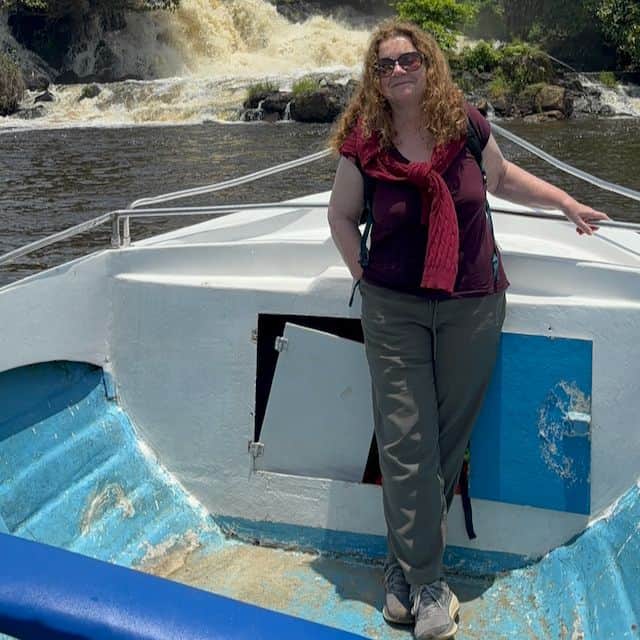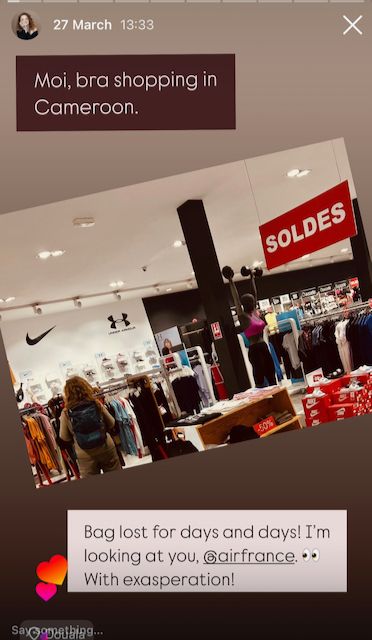
I have left my solo roaming about in Malabo and am now in Cameroon, mostly because it is the most convenient way to get from Equatorial Guinea to République centrafricaine (RCA – or CAR in English). The flight from Malabo to Douala takes about half an hour, much less than from Malabo to Rio Muni, the mainland part of Equatorial Guinea.
Travel buddy David arrived in Douala yesterday. In a couple of days, we will fly onwards to RCA, the main reason for travel this time, where we will meet up with travel buddy Ellen, and five or six strangers. I am a little apprehensive. Not super crazy about travelling with strangers.
Well, I will cross that bridge when I get to it. Today is about Cameroon. Best to make the most of it; a look around Douala is in order.
But first things first. I had expected my bag would be at the hotel when I arrived. Not so! I need to buy some clothes.

Douala
Douala is not Cameroon’s capital, but it is the most important city, the financial capital. In fact, Douala is the commercial capital of the entire CEMAC region, which comprises all the six countries that use the Central African Franc – CFA, as their currency: Cameroon, Chad, Congo, Central African Republic, Equatorial Guinea and Gabon.
In other words, Douala is the heavyweight of the region. One would have thought it a happening kind of place, with all kinds of exciting things going on. But I have been hard pressed to find any appeal in this city, and it is mostly due to traffic and traffic infrastructure, or rather lack thereof. It is also due to people. With the exception of very friendly and helpful staff at Hotel Akwa Palace, I have felt about as welcome in Douala as I did in Conakry. And in Moroni, i.e. not very.
This is also one of those cities where people not only lets you know they do not want you to take photos of them (which of course is understandable), but will get quite aggressive if they think they may have been photographed, even accidentally.
Still… I will add a short photo essay about Douala soon, to give you an idea.
Meanwhile, the best thing to do is to get out of town.
Cameroon’ s many waterfalls
Luckily, Cameroon has a lot to offer in the landscape and outdoors department. There are national parks galore, many of them with waterfalls, my favourite feature of nature. So when deciding where to go for a day away from chaotic Douala, we are spoilt for choice. There are so many waterfalls, we must narrow our focus. The two main ones are
- Ekom-Nkam waterfalls are in a lush forest near Ekom village. Twin waterfalls, 80 metres high, and filming location for Greystoke, the Legend of Tarzan, back in the early 1980s. These falls are 3-4 hours by car from Douala, in the interior regions of the country, about halfway to Bafoussam.
- Chutes de la Lobé is about the same distance from Douala, but in the opposite direction, near the town of Kribi on the coast. What makes this waterfall unique, is that it cascades directly into the Atlantic; sounds pretty spectacular.
Home in Norway, we are spoilt with waterfalls as well, even tall twin ones. But one that plunges right into the ocean…! And when I hear it is possible to take a boat right up to the base of the falls… Well, no contest! That is what I want to do!
Going south
Kribi is 150 km from Douala, the first 1.5 hours on the N3 highway south-east to Edea, then turn south on the N7 towards the ocean and straight to Kribi. Well straight… the road can be a bit unpredictable, especially during the rainy season – potholes and slow going for parts of the way. But there are things to see along the way.
The German bridges

We don’t really hear much about German colonialism in Africa, do we? Though, that could merely say something about a hole in my knowledge of African history. I was only aware of Namibia. But in the late 1800s, Germany, then an empire, also occupied present-day Burundi, Ghana, Rwanda, Tanzania, Togo… and Cameroon.
The Germans simply annexed Cameroon in 1884, and then pushed their way into the interior. It was mostly for business – bananas, cocoa, palm oil, rubber – and the companies administrated the colony. They were not nice, the colonisers, forcing locals to work on plantations and building infrastructure, including several bridges. On the other hand, there is something to be said for German engineering. The bridges still stand, 150 years later.


Then World War I happened. Germany lost. Cameroon became a mandate of the League of Nations and split between France and Britain. Today, 65 years after independence, Cameroon follows the French system of, well, everything. Except… two out of the country’s 10 regions are still English-speaking – and English everything else. Judicial systems, school systems, languages, you name it.
The French predominance has led to protests in the English-speaking regions, where they have been campaigning for the use of English in schools and in the courts. There is also a separatist guerilla group, campaigning for independence of the English-speaking regions, under the name Republic of Ambazonia. The Cameroonian government have not been happy and have retaliated, which again has led to more insurgency. Fighting, terrorist attacks, reprisals, bloodshed at both ends… the struggle goes on. I’m guessing your country’s government, like mine, warns against travel to these regions of Cameroon.
Kribi
But enough of troublesome politics. Let’s move on to something more pleasant: Cameroon’s stunning nature.
We arrive in Kribi around noon, and make a stop at one of the town’s lovely beaches.

From another beach, we see boats and find one that will take us to the waterfall.

Chutes de la Lobé
At Chutes de la Lobé, the Lobé River cascades down a series of gentle rock formations before it dramatically spills over a 20-metre-high cliff, creating a cool visual, where freshwater meets the Atlantic in a powerful display, all surrounded by lush tropical forest.
The falls look a bit puny from a distance –

– but as we get closer, we can feel the force.


And get very wet.
The combination of waterfall and ocean creates a unique and very cool environment.
Around us, people are fishing in the ocean, by the falls.
Back in Kribi
Returning to Kribi, we hang around the beaches a bit more.

Then, it is time for lunch with a view –

– at this cosy, colourful place.

Then a stroll through the town’s fish market –


Boats pulled up on shore at Kribi’s fish market
– before heading back to Douala.

This is our driver, so the photo is published with permission.
Please visit:
Our Sponsor

